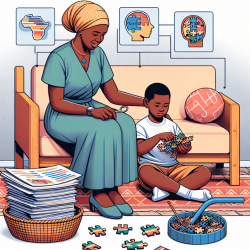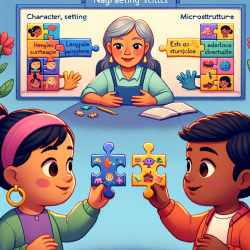As speech-language pathologists (SLPs), our role in supporting children with Autism Spectrum Disorder (ASD) and their families is critical. Understanding the lived experiences of caregivers can provide invaluable insights into how we can better serve these families. The research article "Lived experiences of caregivers of children with autism spectrum disorder in Kenya" offers a comprehensive look into the challenges and needs of caregivers in a resource-limited setting. Here, we delve into the key findings and discuss how SLPs can implement these insights to improve outcomes for children with ASD.
The Burden of Care
The study highlights the significant emotional, social, and economic burdens faced by caregivers of children with ASD in Kenya. Caregivers reported feelings of isolation, stigma, and a lack of support from both their communities and the government. These challenges are exacerbated by cultural beliefs that often attribute ASD to supernatural causes or blame the mother for the child's condition.
Key Findings
- Emotional Dilemmas: Caregivers experience a range of emotions, from denial and shock to acceptance and advocacy. The journey to acceptance is often fraught with cultural misconceptions and a lack of accurate information about ASD.
- Strained Relationships: The demands of caring for a child with ASD can strain marital relationships and affect the entire family's social dynamics. Many caregivers reported feeling unsupported by their spouses and extended families.
- Support Systems: Despite the challenges, caregivers found solace in support groups and therapy sessions. These interactions provided a sense of community and shared understanding, which are crucial for emotional well-being.
Implementing Research Insights in Practice
As practitioners, it is essential to integrate these insights into our therapeutic approaches. Here are some strategies to consider:
1. Culturally Sensitive Interventions
Understanding the cultural context is crucial. SLPs should work with local communities to dispel myths about ASD and provide accurate information. Collaborating with community leaders and using culturally relevant materials can help bridge the gap between scientific knowledge and cultural beliefs.
2. Family-Centered Care
Given the strain on family relationships, SLPs should adopt a family-centered approach. This includes involving family members in therapy sessions, offering counseling services, and creating support networks for caregivers. Empowering families with knowledge and coping strategies can significantly improve their resilience and ability to support their children.
3. Advocacy and Awareness
SLPs can play a pivotal role in advocating for better services and support for children with ASD and their families. This includes lobbying for policy changes, increased funding for ASD services, and public awareness campaigns. By raising awareness, we can help reduce stigma and promote inclusion.
4. Collaborative Care Models
Interdisciplinary collaboration is essential for comprehensive care. SLPs should work closely with occupational therapists, psychologists, and other professionals to provide holistic support. This collaborative approach ensures that all aspects of the child's development are addressed.
Encouraging Further Research
While the study provides valuable insights, there is a need for further research to explore the unique challenges faced by caregivers in different cultural contexts. SLPs can contribute to this body of knowledge by conducting qualitative studies, sharing case studies, and participating in collaborative research projects.
To read the original research paper, please follow this link: Lived experiences of caregivers of children with autism spectrum disorder in Kenya.
By understanding and addressing the unique challenges faced by caregivers, we can enhance our practice and create better outcomes for children with ASD. Let us continue to advocate, educate, and innovate in our efforts to support these families.










